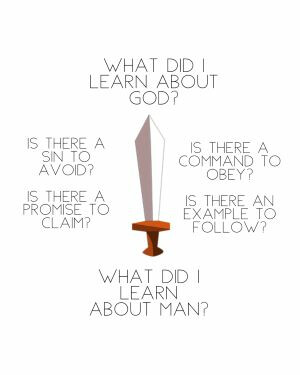How to Gain the Most from Bible Study
Whether you’re reading the Bible for the first time or the twentieth time, it is important to get the most out of the crucial messages which bound each passage. Digging deeper into your studies of the Bible can achieve a better understanding of His word and amplify your personal relationship with our Lord. For some, Bible Study can be somewhat of a daunting task, but we have some tips and tricks to help ease the process and help you feel closer to God.

What Tools Are Available?
There are an array of tools available to enhance your studies. Let’s take a look at the options.
- Study Bibles- A Study Bible is an edition of the Bible that has additional information in order for the reader to gain further insight into the context. This can include annotations for difficult verses, historical information, biographies, definitions of complex words, and much more. Depending on which Study Bible you are using, it can be an all-in-one option.
- Bible Journals- A Bible Journal is exactly what it sounds like. It is a journal where you write down your thoughts, questions, feelings, and anything else that comes to mind while you are reading your Bible. You can journal by writing directly in your bible, in a notebook, or there are many different Bible Journals on the market. Some of the Bible Journals you can purchase are normal Bibles that are bigger, providing more room for your notes. Bible journaling can be a great way to get creative. Many people decorate their journals, drawing artwork inspired by scripture or passage.
- Bible Dictionaries- Bible Dictionaries are dictionaries with helpful entries for vital information in the Bible. The entries include specific words, themes, locations, people, and doctrines. It can be an excellent tool to use for reference.
- Parallel Bibles- Parallel Bibles can be tremendously useful, especially when you are having a tough time understanding a passage. Parallel Bibles are multiple translations built into one book, so you can easily compare and contrast verse by verse, or even word by word if you needed to. This can help you comprehend the nature of the message.
- Daily Devotionals- Daily Devotionals most often come in a booklet or book form. Daily Devotionals offer a scripture to read once a day, often paired with a remark relating to the scripture. They can be used as an extra utensil to complement your studies.
- Bible Atlas- A Bible Atlas is a compilation of maps for places referenced throughout the Bible. These can be useful when studying the Bible geographically.
- Bible Concordances- A Bible Concordance is an all-encompassing index of references used in the bible.
- Bible Commentaries- A Bible Commentary is a series of books that analyze the Bible. They contain interpretations and observations. Bible Commentaries can examine whole books of the Bible, different passages, or individual verses.
- Apps and Websites- With technology continually growing there is a wide range of different Apps and Websites devoted to helping you with your Bible Studies. Any of the above-mentioned tools can be found online. But if that’s not your thing, that’s okay. One of the most important keys to Bible Study is finding what works for YOU.
Different Ways to Read The Bible:
You’re ready to read the Bible, the desire to learn more is there, and the motivation to seek a deeper personal connection with God weighs heavily on your soul, but you’re not entirely sure where to start. Does this sound familiar? Luckily, there are so many different ways to dive into your reading.
- Cover-to-Cover- Read the Bible from beginning to end.
- Chronologically- Read the Bible in chronological order of the events and stories throughout it.
- By Topic- Read the Bible by focusing on passages and books that pertain to a specific topic.
- Geographically- Choose what to read based on a geographical location of your liking. Once you’ve finished a location, you can start another.
- Book-by-Book- Pick any book you’d like to read. Once you’re finished, simply pick another book.
- Cross-References- Pick a keyword and read passages that regard your word. Cross-reference your keyword and read the passages which relate.
- Character Study- Choose a person in the Bible you’d like to research. Read chapters and verses that apply to them.
You can try any one of these approaches, and if one doesn’t feel right, that’s okay. You can go ahead and try another one. It doesn’t matter which technique you use as long as you are attaining a better understanding of His words.
Some Methods Used to Maximize Bible Study:
Here are some methods you can use to ensure you are getting the most out of your studies.
- Use the SOAP Method- SOAP stands for Scripture, Observation, Application, Prayer. With the SOAP Method, you first choose your scripture. During your reading, take note of any observations that stand out to you. Ponder how you’ll apply these observations to your life. Be sure to end your studies with a prayer.
- The Sword Method- While you’re reading a passage, imagine you’re holding a sword with the tip pointing up toward God in Heaven. The handle is aimed toward you, a person, man. The sides of the sword are sharp, they cut. With this method, the sides of the sword represent cutting through life. As you read your passage, ask yourself the following questions.
- Tip Pointing Toward God: What did I learn about God?
- Handle Pointing Toward Man: What did I learn about man?
- Left Side of the Sword: Is there a sin to avoid? Is there a promise to claim?
- Right Side of the Sword: Is there a command to obey? Is there an example to follow?

- The HEAR Method- HEAR stands for Highlight, Explain, Apply, Respond. This method is akin to the SOAP method. Highlight anything that stands out to you. Explain what this passage means to you. Apply it to your life. Finish by responding to the passage. The best way to respond is with a prayer.
- The Journalist Method- For this method, pretend you are a journalist. Ask yourself the classic journalism questions: Who? What? Where? When? Why? How?
Additional Tips:
- Pray before your studies. Invite the Spirit and ask for guidance.
- Look for keywords.
- Use color-coding when highlighting passages.
- Set aside a specific time to study your Bible.
- Read to learn, to seek out the context. Don’t read for the purpose of reading. Read to benefit from the message.
- Don’t skip or leave out any books. There is vital wisdom to be learned throughout the entire Bible.
- If you are using a Bible Commentary, wait to read it until you’ve read the passages and had an opportunity to create your own reflection.
- Be patient with yourself.
Studying the Bible leads you on an enlightening spiritual journey. It enables you to grow closer to our Father in Heaven. Reading the passages can guide you to pertinent answers in your life.
-Torrance Church of Christ
